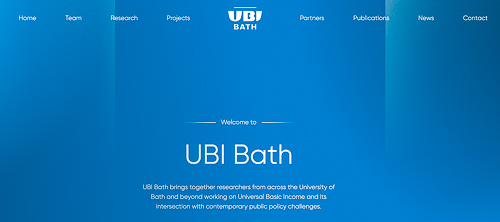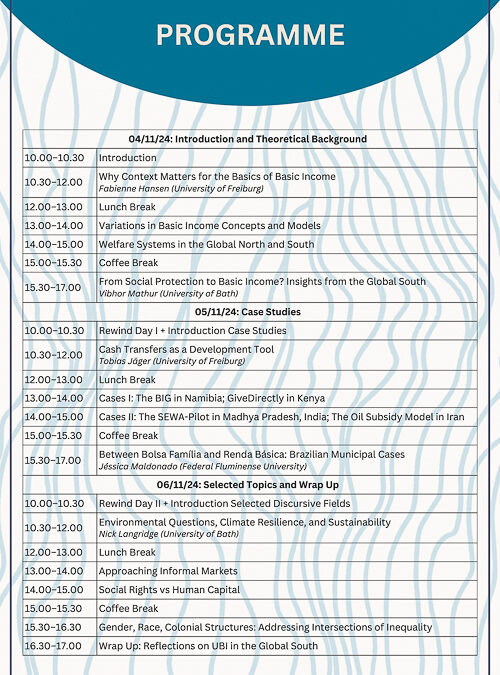
by Neil Howard | Jan 22, 2025 | News
In this event, we will be joined by one of the architects of the Swiss Basic Income Referendum, Enno Schmidt. To date, Switzerland is the only country anywhere that has gone to the polls over whether or not to adopt a basic income for all. Despite ingenious campaigning, the referendum was unsuccessful – a majority of Swiss were swung by economic and work ethic arguments against the policy. This conversation will shed light on the history of the referendum, how it came to be on the ballot box, what the campaign was like and where it was won and lost. It will also turn to the future, to prospects for a second referendum in Switzerland and for basic income in Europe and beyond.
The event will take place on Wednesday, 29th January 2025, from 3pm – 4:15pm. It will be a hybrid meeting, hosted in 8 West 2.34 and online here.

by Neil Howard | Jan 17, 2025 | Opinion
Photo by Hamid Roshaan on Unsplash
Social assistance is everywhere conditional, and in Pakistan it is no different. Either it comes with behavioural strings attached — ‘do this and we’ll help you, don’t and we won’t’ — or it is targeted, with receipt conditional on being a specific type of person or facing a particular type of problem (think Benazir Income Support Programme [BISP] and the extreme poor).
Those who defend this approach typically offer the same justifications. First, they argue, resources are limited, which means that we should give them to those most in need and make sure they use them well. Intuitively sensible, this position quickly gives way to the troubling claim that as the poor aren’t used to having any money, we should ‘guide’ them so that they don’t waste what they get. Inside this sits the pernicious, yet sadly widespread, prejudice that the poor are feckless and do not deserve our support.
Critics of these positions abound, as they do of conditionality more broadly.
To read the full article in Dawn, click here.

by Neil Howard | Jan 4, 2025 | Opinion
“When the authorities provide social assistance to those in need, it almost always comes with conditions attached. These include behavioural requirements or criteria determining who is and isn’t eligible for support.
Common examples include proving that you’re looking for a job, are too ill to do so, or that you fall into a particular category that policymakers have decided is worthy of aid – for example, working children or single parents.”
To read the full article, click here.

by Neil Howard | Nov 12, 2024 | Events, News
This two-hour conversation with Dr. Karina Dotson and Dr. Elizabeth Rhodes will see the researchers behind the pioneering OpenResearch Unconditional Basic Income Pilot to present their initial results. This pilot was one of the largest UBI pilots to date and has generated significant media interest due to its scale, quality, and association with OpenAI Founder, Sam Altman. The pilot randomly assigned 1000 individuals to receive $1000 per month and 2000 individuals to receive $50 per month for three years. The study has involved multiple rounds of survey and in-depth qualitative research looking at impacts on work, wellbeing, health, education, and more. The session will combine an extended presentation and ample time for questions.
When? 3pm UK Time, Weds Nov 13th
For the Zoom link click here.

by Neil Howard | Oct 21, 2024 | Events, News
A universal basic income (UBI) is a periodic cash payment unconditionally delivered to all individuals, without means testing or work requirements. Today, a broad variety of ideas surrounding the topic of UBI circulate globally, leading to debates, suggestions, and experimentation, but not to the implementation of what is seen as a “full UBI.” Instead, basic income proposals differ among many dimensions, goals, and localities. Since the early 2000s, a curious trend can be observed in the Global South in this context: With the rise of conditional cash transfers (CCTs), the focus on conditionalities and targeting as development and poverty reduction tools has significantly influenced possible dealings with UBI ideas. But UBI scholars and advocates have influenced the CCT discourse likewise, for example, through the BIG grant in Namibia, the initiative of GiveDirectly in Kenya, the UBI pilot in Madhya Pradesh, India, or the intermingling of UBI advocacy with the social protection program Bolsa Familia in Brazil.
This winter school explores the multifaceted topic of UBI in the context of the Global South, providing an overview of the specific contexts, challenges, and outcomes of UBI pilots and experiments, as well as related and inspired policies and initiatives. It will explore the political and ethical considerations surrounding the debates on UBI in countries of the Global South, including the topics of social rights, equity, and the role of government intervention. Through a variety of case studies, it aims to create a critical understanding of the potential and limitations of UBI as a tool for social and economic transformation in so-called ‘developing countries.’
Attendence is free and can participation is welcome in person and online. Please register here.





